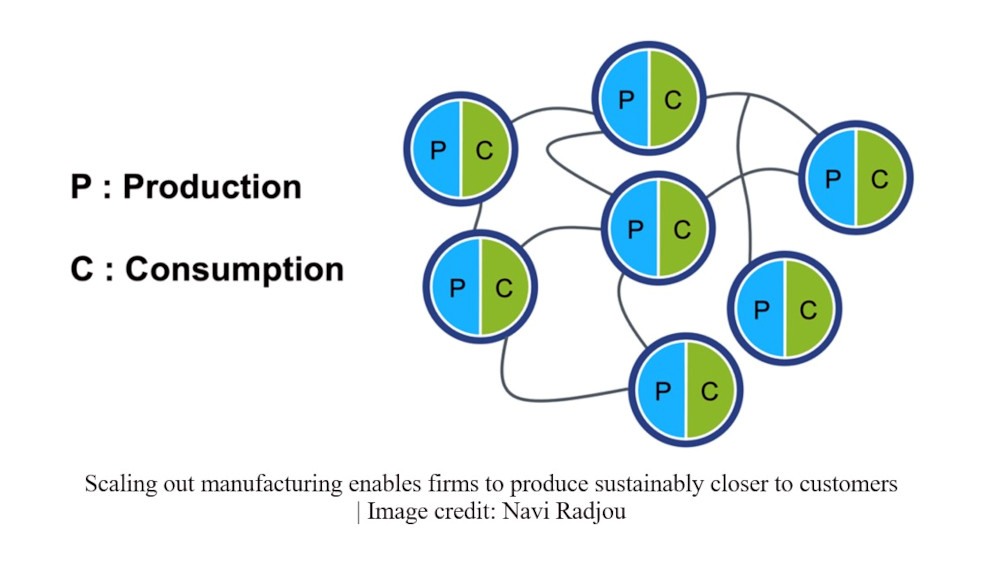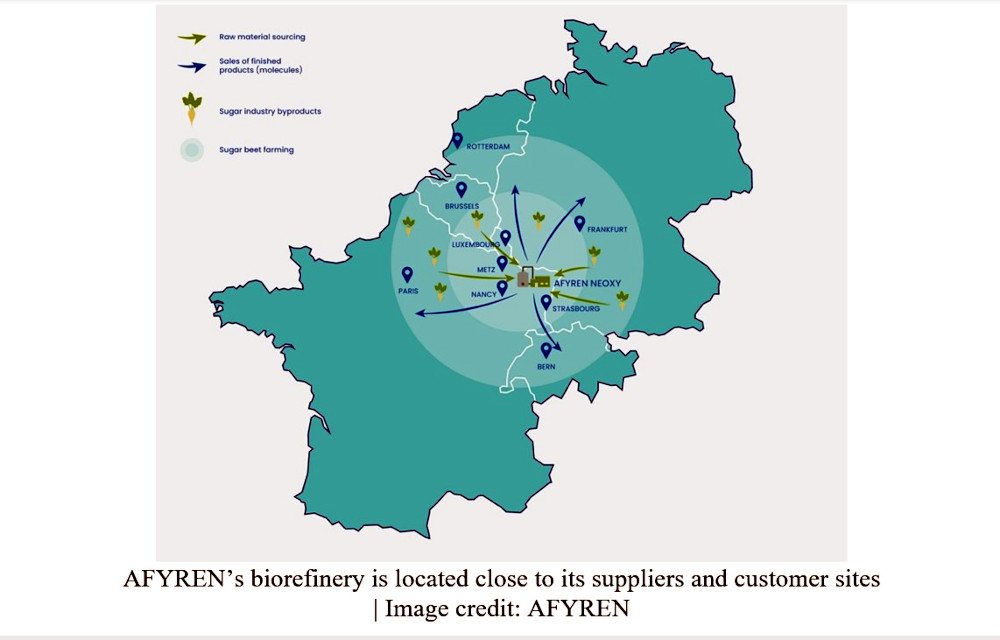Europe inside the nineteenth century, the US inside the twentieth century, and China in
present a very long time have all expert exponential monetary progress by “scaling up”
vertical manufacturing — that is, by centralizing industrial actions in huge
factories. Nonetheless this energy-intensive mass manufacturing model has depleted pure
sources
and considerably damaged our environment (the financial sector accounts proper this second for
virtually
one-third
of US greenhouse gas emissions).
At the moment, an unlimited reindustrialization is
underway
inside the US and Europe as Western nations try and ship once more
manufacturing
that they beforehand outsourced to low-cost nations resembling China. Learning from
the earlier, US and European producers must stay away from scaling up vertically their
operations in gigafactories. As a substitute, they should “scale out” horizontally —
using a distributed present group with many small, hyper-agile factories
located closest to prospects (see Decide underneath).

The a number of benefits of scaling out manufacturing
By scaling out their manufacturing and producing in small factories located
nearer to prospects, firms can reap many benefits:
Slash fixed costs and dealing payments
Firms can stay away from the large capital expenditures (CapEx) needed to assemble and
run massive high-volume factories. As an illustration, Tesla intends to invest $10
billion
to assemble its gigafactory in Mexico — which is nearly twice higher than
its Berlin
gigafactory.
In contrast, French electrical mobility startup Avatar
Mobilité is developing a group of micro-factories
which may be organize cost-effectively and shortly all through France and in
rising nations. Avatar is the creator of
Ulive — an ultralight
electrical automotive that weighs solely 350 kg (771 kilos) and consumes thrice
a lot much less vitality than a standard EV. In each Avatar micro-factory — no bigger than
a spacious storage — native entrepreneurs can assemble the Ulive in a matter of
hours. The Ulive is obtainable at €15,000 ($16,600), which is a discount compared with
EVs supplied inside the US that worth on frequent
$60,544.
Shrink logistics costs
Firms can curb inbound logistics costs by sourcing raw provides and components
regionally, eradicating the need to move them from various distant suppliers to a
centralized manufacturing unit. And by selling their accomplished merchandise on to
prospects located near their micro-factory, firms can forego intermediaries
and slash distribution payments and emissions by avoiding supply to distant
components of consumption.
For example, Canadian startup Relocalize is on a
mission to decarbonize and hyper-localize meals and beverage manufacturing — which
contributes 37 % of worldwide GHG emissions. Relocalize’s high-tech
micro-factories can produce, bundle deal and pelletize meals and beverage devices on
the spot at grocery distribution services — subsequently, eradicating middle-mile logistics
and drastically decreasing GHG emissions, water use and plastic air air pollution.
Relocalize’s first reply is an autonomous micro-factory — which can match
inside a repurposed supply
container
— that will produce packaged ice in licensed plastic-negative
baggage on-demand and on-site at retailer
distribution and success services. This eliminates the crazy should ship
ice over 1,500
miles
to distribution services, as a result of it’s carried out proper this second.
Improve resilience and agility
Distributed manufacturing provides bigger present chain
redundancy
than centralized manufacturing. In case micro-factory X in location A malfunctions,
micro-factory Y in shut by location B can take over the duties and full
pending purchaser requests. Even greater, you can expedite a “manufacturing unit in a
discipline”
— a pre-assembled manufacturing facility in a container — which may be shortly
organize at location A for emergency manufacturing whereas micro-factory X is being
repaired.
As an illustration, world biopharmaceutical company Bayer piloted a flexible
manufacturing mission named F3 (versatile, fast and future)
Manufacturing unit — a conveyable,
modular manufacturing unit designed to swimsuit inside a container. This mobile manufacturing unit
can shortly be deployed on the customer’s industrial location to manufacture and
distribute a variety of customized chemical substances in small parts. The F3 pilot
mission demonstrated a 40 % decrease in capital investments, 30 %
vitality monetary financial savings, 30 % low cost in CO2 footprint, and an enormous
enchancment in time to market.
Ship personalised gadgets flexibly and profitably
All through the nineteenth and twentieth centuries, firms scaled up their manufacturing in
ever-larger factories to comprehend economies of scale. They vied to lower
payments by mass-producing standardized gadgets. At the moment, nonetheless, eco-conscious
customers search customized
merchandise
which could be made nearer to the place they
dwell.
Subsequently, firms should revamp their industrial model in order to acquire
economies of
scope. They need to
research to produce cost-effectively, in low amount, all types of personalised
merchandise in digitally optimized micro-factories located in proximity to
prospects. To know economies of scale, you would
develop to be further atmosphere pleasant. To realize economies of scope, you would enhance your
agility.
AI-powered industrial automation choices can ship this agility. San
Francisco-based startup Shiny Machines
(BM) has created fully automated and easily configurable micro-factories, with
which prospects can produce quite a lot of issues — from electronics to dwelling
house tools — near the consumer, enabling versatile and eco-friendly
manufacturing. Using BM’s versatile automation choices, prospects have been
able to launch new merchandise 28 events sooner compared with handbook assembly and
enhance their manufacturing throughput by 2.5 events.
Flip into further sustainable
By outfitting their micro-factories with digital fabrication utilized sciences
(DFTs) resembling CNC machining and 3D
printing,
firms can receive 4 advantages:
-
benefit from fewer raw provides
-
produce a lot much less waste
-
reduce their carbon footprint, and
-
lower transportation payments.
Additive
manufacturing
(a elaborate title for 3D printing) is “frugal,” as a result of it generates 70-90 % a lot much less
waste
compared with typical manufacturing methods.
Commerce
4.0
players along with Xometry,
Protolabs and Sybridge perform
a distributed group of small-scale factories run by DFTs resembling 3D printers
that take away the necessity of transporting components all through the globe to be
assembled in an enormous, centralized manufacturing unit. As a substitute, design data for a model new
product could also be electronically transferred to the micro-factory located closest
to a purchaser, the place it might be 3D printed shortly using provides which could be
merely accessible in that house.
Maximize social impression in native communities
Firms can assemble functionality and regenerate “left-behind” communities — resembling
former coal-mining cities inside the US hinterland — by establishing micro-factories
that will provide from small suppliers situated shut by and put together and make use of
native experience.
For example, textile-waste recycling agency Re-Up to date
Worldwide items up microfactories in underdeveloped
communities
beneath a franchising model. Each recycling micro-factory, run by an entrepreneur,
employs people within the native individuals who moreover research priceless skills to succeed
in a spherical
financial system. Re-Up to date
is an excellent occasion of “triple
regeneration”
(to be coated in Half 4 on this assortment) — a holistic methodology to creating
monetary, social and ecological value synergistically in disadvantaged areas.
Case look at: How AFYREN is scaling out the $30 trillion bioeconomy
The bioeconomy targets to
trade the toxic and polluting “petro-sourced” provides utilized in industrial
value chains with cleaner, “biobased” provides. The bioeconomy holds immense
progress potential: The European bioeconomy is already worth €2.4 trillion
euros;
whereas the US bioeconomy is true this second valued at over $1
trillion,
or 5 % of US GDP. Estimated at $4
trillion
proper this second, the worldwide bioeconomy is poised to develop to $30
trillion
by 2050.
AFYREN is a French startup shaping the bioeconomy. It’s
NEOXY plant in Northeastern France is
a biorefinery that “upcycles” agricultural residues into seven priceless
biomolecules known as carboxylic pure acids — utilized in fields along with
animal and human vitamin, cosmetics and lubricants. AFYREN has optimized
NEOXY’s industrial processes, so it produces 5 events a lot much less CO2 and greenhouse
gas emissions compared with typical methods of producing acids from fossil
fuels.
AFYREN initiatives a $15 billion world market for its seven biobased pure
acids. What makes its working model most intriguing is that the majority of
its suppliers are situated inside a 250 km (155 miles) radius of its NEOXY
manufacturing unit (see Decide underneath). NEOXY gives world prospects by the use of its
industrial facilities in Western Europe for added product processing.

In 2023, AFYREN teamed up with Mitr Phol — a
important world sugar enterprise participant headquartered in Bangkok, Thailand. The
plan is to find out a second biorefinery in
Thailand
to transform sugarcane byproducts from native suppliers into high-value biobased
merchandise for Asian markets, which account for 25 % of worldwide carboxylic
acid demand.
AFYREN is considering the selection of constructing its third biorefinery inside the
United States that will rework agricultural waste — resembling corn
byproducts
— sourced from US farmers into priceless merchandise for the North American market.
As a substitute of scaling up its manufacturing by centralizing all its manufacturing in a
single, massive manufacturing unit that will present all world markets, AFYREN correctly
decided to “scale out” by working modestly sized factories located in two vital,
regional markets: Europe and Asia.
Every biorefinery solely makes use of raw provides abundantly accessible regionally and
caters largely to regional purchasers. AFYREN’s hyper-local bioeconomy value chains
cut back carbon footprint and maximize the livelihoods of native farmers, who
earn further by selling their agricultural
waste.
By scaling out their manufacturing with a distributed group of agile
micro-factories rooted in native communities, firms can obtain in agility and
resilience and produce and ship personalised gadgets sooner, greater, cheaper
and further sustainably.
Study further regarding the frugal financial system:
This textual content has been partially tailor-made from the creator’s upcoming information, The
Frugal Monetary system: A Data to Developing a Larger World with
A lot much less (2024),
printed by Wiley and Thinkers50.



